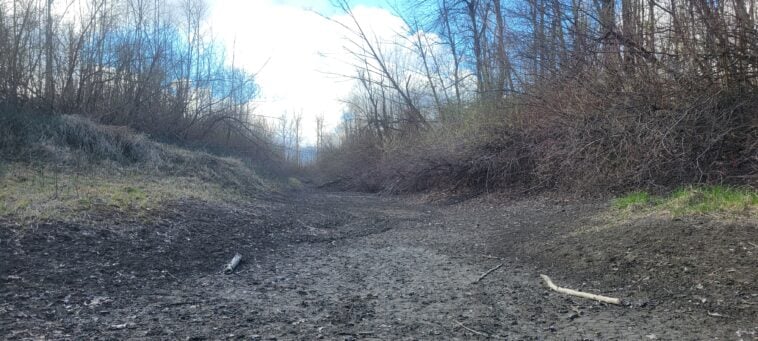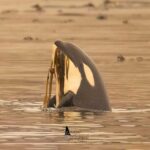Watershed experts are concerned that BC could be facing another significant drought year, with recorded snowpack levels at 37% below the annual average. The latest Ministry of Water, Land and Resource Stewardship’s monthly survey findings are the lowest levels seen in fifty years. Some regions are harder hit than others, like the Fraser River near Hope, where the snow basin index is 39% below the average.
“We were already in a multi-year drought coming into this year and facing a water deficit.”
Tim Morris, Project Director of BC Water Legacy and member of the BC Watershed Security Coalition
Tim Morris, Project Director of BC Water Legacy and BC Watershed Security Coalition member, is particularly worried about the consequences of the low snowpack after last year’s historic drought and wildfire season. “We were already in a multi-year drought coming into this year and facing a water deficit,” he said, adding that “a lower than normal snowpack is very concerning as we get into summer.”

Snowpack Impact
“Snowpack is like a savings account for our water supplies,” Morris explained. Snowmelt plays a crucial role in replenishing our rivers, lakes and groundwater, especially as rainfall lessens in the spring and summer seasons. Low snowpack means low reservoir levels, impacting everyone from the average citizen to our farmers, fishers, and firefighters.
He said individual conservation efforts like reducing lawn watering and shorter showers are important, but BC needs to implement stricter government policies for regulating industrial use. Most industrial water users are not required to meter or report their actual water use relative to what they are licensed to use. The biggest industrial users in BC pay just $5 for every Olympic swimming pool worth of water – less than an average pint of beer, Morris pointed out.
“We don’t have a clear picture of the demand being placed on our water supplies,” he said, adding industry can use as much water as a medium-sized city. “This makes it really challenging to manage water effectively, especially during drought where every drop matters.”
Preparing for Drought Season

Last year, with a snowpack just 12% below average levels, BC faced its worst drought on record, where most of the province’s water basins were at Level 4 and 5 drought conditions throughout the summer. Some towns, like the Village of McBride, were still in a state of water emergency as of January this year.
Widespread drought contributed to the worst forest fire season this province has ever seen, with a total of 2.84 million hectares of forest and land burned. The increased severity of droughts, wildfires, and floods are recognized as climate change-related events caused by our reliance on fossil fuel emissions.
“Drought poses a major challenge for local food systems and our overall food security.”
Tim Morris, Project Director of BC Water Legacy and member of the BC Watershed Security Coalition
Experts like Morris are concerned about the long-term impact that drought will have on BC’s ecosystems and, as a result, our food supply. “Drought poses a major challenge for local food systems and our overall food security,” he explained.
Farmers and their crops need sufficient irrigation to grow vegetables and fruit, but also wild fish populations – our “wild food security” – need fresh water levels to be high enough for them to spawn and thrive. These vulnerable salmon populations “are an essential part of BC’s food security picture, especially for First Nations communities,” he added.
Last year, there were several events of mass wild fish deaths, where rivers had dried up or shallow pools overheated, depriving fish of the oxygen needed to survive. Emergency response measures like Salmon SWAT teams were dispatched to regions to find creative ways to save the salmon barely surviving in diminishing freshwater habitats. The Tsleil-Waututh Nation and Pacific Salmon Foundation, for instance, teamed up in the Lower Mainland to dig trenches for thousands of salmon struggling to reconnect with the Indian River, after which they were successfully able to migrate upstream and spawn.
“I would like to think that we’ll be able to plan a more strategic response and that these kinds of emergency actions won’t be needed,” Jane Pendray, Program Manager of the Pacific Salmon Foundation, said at the time. “But I think that realistically, these kinds of emergency responses will still be needed on some level in the future.”
Meanwhile, Premier David Eby said he was “profoundly worried” about the upcoming forest fire season, announcing that the province is already taking precautionary measures, including setting aside $10.6 billion in contingency funds over the next three years and organizing an “army” of firefighters.
Improving Our Watersheds

Morris said the good news is that it’s not too late to change things. “There is a lot of room for improvement in how BC takes care of its watersheds,” he told us. The first move is to reduce personal and industrial water use, he explained, by implementing universal metering for both and being transparent with the data. Morris pointed out that provinces like Ontario, Quebec, and PEI already make this information widely available, encouraging industry to be accountable to the public.
“Restoring wetlands, protecting mature and old growth forests, and reintroducing beavers… have been shown to be extremely effective at keeping the landscape wet for longer and providing storage for a wide range of needs.”
Tim Morris, Project Director of BC Water Legacy and member of the BC Watershed Security Coalition
Morris argued that we can also do more to enhance watershed protection to capture rainfall and snowmelt. “Restoring wetlands, protecting mature and old growth forests, and reintroducing beavers… have been shown to be extremely effective at keeping the landscape wet for longer and providing storage for a wide range of needs,” he explained. These ecological efforts are not just helpful for drought but also crucial for mitigating floods and the spread of wildfires.
Morris also advocates for increased investment in local watershed boards in partnership with First Nations and local communities. This allows those most impacted by activities in their watersheds to have more of a say in exactly what activities are permitted.
“Watershed boards promote cooperation by bringing local people together around shared goals for the watersheds they call home,” Morris said. He pointed out that there are already great examples across the province, like the Cowichan Watershed Board and Okanagan Basin Water Board.
“It’s time the BC government built on these successful models so that everyone, in every region, can benefit,” he commented.




